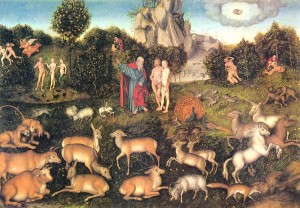In a time when materialism was replacing religious belief, George Berkeley suggested another perspective to the Creation ideal. Popular thought for his time period believed that all matter on earth could be broken down into “atomic and corpuscular structure” (p. 140). The universe that they perceived was materialistic and physical events could be explained by mechanistic laws. Our world was just “matter in motion”. The materialistic perspective falls under the Creation sector because it deals with and examines the questions of created things and events.
Berkeley though, rejected the idea of materialism and suggested that matter does not exist. This challenges the traditional way that we examine Creation. I think that we are quick to associate Creation with the idea of making something –which more often than not, usually evokes a physical and tangible connotation. For Berkeley we are in a world of our perceptions and nothing more. Creation in this sense exists in the mind as what are called Secondary Qualities. This is not to say that Berkeley rejected the idea of an External Reality and claimed that our perceptions alone are valid. Instead, he understood the fallacies present in that thinking and acknowledged that God’s perceptions make up the consistent reality that is not a subjective experience from person to person.
When God created the world He spoke. The reality that resulted came from within Him. Words are not tangible. For all we know, the world began for us through an intangible and most certainly unknown mechanistic way. Reality for us as human beings is the sum of our perceiving God’s perceptions. We give His way entrance into our own minds and our perceptions are changed as a result. Essentially, according to Berkeley, “to be [human] is to be perceived”. The “good life” results when our perceptions synonymously line up with God’s.
Imagine the garden and the reality that Adam and Eve walked as God spoke. Prior to the fall, their perceptions of reality could be argued to be exactly like God’s. For the first and only time in all of Creation man’s and God’s realities were identical. As God spoke His world into motion, His ideas became the reality of the garden. This idea stems from Berkeley’s Principle of Association. For Adam and Eve the integration of their senses wove together what we would imagine the garden to be. By sunlight and color, hard and soft, hot and cold…etc etc the garden came to be. And it was Good (Genesis 1:31).
God saw all that he had made, and it was very good.
I think that if we apply George Berkeley’s beliefs, we can see that the term “made” is in and of itself an act of Creation. His explanation poses the question that perhaps “made” does not imply the physical. A perception is made. And that perception can create/define reality.


Caroline Nikolaus
10:54 am, 09.21.13
Jess, I love your thoughts on this. You explain Berkeley’s beliefs in a very intelligent and reflective way. Throughout time it has been hard for humans to look past what we can see; there is a mind block for many people to attempt and even attain a higher level of thinking for certain unknowns in life, especially Creation. Berkeley presents us with a fascinating idea that “we are in a world of our perceptions and nothing more.”
I like thinking that my perception of reality is a reflection of God’s perception, or it is through understanding God’s perception that we understand the world.
Rachel Easley
10:12 pm, 09.21.13
Hey Jess! I really enjoyed reading your well put together and intelligent blog post. Berkeley certainly has an interesting perspective on mankind and our existence on this planet. By rejecting the idea that there is no external reality and that our perceptions alone are valid, we are left relying on ourselves and our thoughts. I personally wouldn’t agree with this view on life because I would love to believe a greater, more coherent power was in charge and governing truth in a consistent way. I have learned enough about myself to learn I can’t trust myself in certain regards.
Levi Ritchie
11:10 pm, 09.23.13
This would be a very abnormal viewpoint for a Christian to take, so I like your discussion and explanation for it. Such an explanation would completely change the debate over a created universe versus one that came to be on its own.
Furthermore, the counterpoint to “life is just matter in motion” is normally “No, life is more.” Opposing that sort of argument with “No, life is either less or immeasurably different in type” is worth thinking about, even if we don’t come to agree with it.